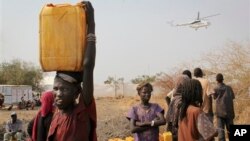Representatives from donor countries begin meeting in Oslo Tuesday to decide how much aid to give to South Sudan. The meeting follows more than five months of conflict in the country. The International Rescue is calling on donors to be generous to help relieve rising malnutrition, especially among children.
IRC’s Ciaran Donnelly said a lot of money is needed for South Sudan, and it’s needed now.
“The United Nations [is] calling for $1.8 billion of funding to be allocated to this crisis. That’s $1.26 billion on top of $500 million plus that’s already been allocated. That seems like a lot of money. But in terms of the needs that we’re facing in South Sudan -- both the urgent humanitarian needs right now, as well as the investments needed to prevent a famine over the coming nine months or so -- that really is bare bones, nuts and bolts programming.”
Donnelly -- the NGO’s vice-president for program quality -- said humanitarian conditions in South Sudan have grown worse.
“We’re seeing a situation that has continued to deteriorate since the outbreak of fighting last December. We’re at a situation right now where we have 1.3 million displaced – 300,000 plus of those people are outside the country. And we have up to a million people displaced within the country living in really appalling conditions – some of them concentrated on U.N. bases. Many of them have fled to neighboring counties,” he said.
It’s only going to get more difficult to deliver aid.
Donnelley said, “We’re entering the rainy season and seeing a really worrying, concerning situation as far as food security goes, where we’re seeing acute malnutrition rates spiking in hard to reach areas. We’re struggling to get food and supplies into many of those areas – not just the IRC, but the humanitarian community as a whole. And we’re really very concerned about what the next several months hold.”
The IRC conducted surveys last month in Aweil South and Panyijiar counties and found malnutrition rates among young children of around 30 percent. It said those levels are double what the World Health Organization considers critical.
Donnelley added that children are being recruited as soldiers and women and girls are being sexually assaulted by both sides.
“One of the key messages for the donor conference here in Oslo over the next couple of days is that urgent action is needed to avert the loss of another generation of South Sudanese children,” he said.
The International Rescue Committee has worked in South Sudan for several decades. Among other things, it provides emergency health services, counsels survivors of sexual violence, supports programs for children and provides assistance to refugees and the internally displaced.
The IRC is encouraged by the recent agreement establishing a month of tranquility in the country. But said success in providing assistance depends on gaining access to all parts of South Sudan.
IRC’s Ciaran Donnelly said a lot of money is needed for South Sudan, and it’s needed now.
“The United Nations [is] calling for $1.8 billion of funding to be allocated to this crisis. That’s $1.26 billion on top of $500 million plus that’s already been allocated. That seems like a lot of money. But in terms of the needs that we’re facing in South Sudan -- both the urgent humanitarian needs right now, as well as the investments needed to prevent a famine over the coming nine months or so -- that really is bare bones, nuts and bolts programming.”
Donnelly -- the NGO’s vice-president for program quality -- said humanitarian conditions in South Sudan have grown worse.
“We’re seeing a situation that has continued to deteriorate since the outbreak of fighting last December. We’re at a situation right now where we have 1.3 million displaced – 300,000 plus of those people are outside the country. And we have up to a million people displaced within the country living in really appalling conditions – some of them concentrated on U.N. bases. Many of them have fled to neighboring counties,” he said.
It’s only going to get more difficult to deliver aid.
Donnelley said, “We’re entering the rainy season and seeing a really worrying, concerning situation as far as food security goes, where we’re seeing acute malnutrition rates spiking in hard to reach areas. We’re struggling to get food and supplies into many of those areas – not just the IRC, but the humanitarian community as a whole. And we’re really very concerned about what the next several months hold.”
The IRC conducted surveys last month in Aweil South and Panyijiar counties and found malnutrition rates among young children of around 30 percent. It said those levels are double what the World Health Organization considers critical.
Donnelley added that children are being recruited as soldiers and women and girls are being sexually assaulted by both sides.
“One of the key messages for the donor conference here in Oslo over the next couple of days is that urgent action is needed to avert the loss of another generation of South Sudanese children,” he said.
The International Rescue Committee has worked in South Sudan for several decades. Among other things, it provides emergency health services, counsels survivors of sexual violence, supports programs for children and provides assistance to refugees and the internally displaced.
The IRC is encouraged by the recent agreement establishing a month of tranquility in the country. But said success in providing assistance depends on gaining access to all parts of South Sudan.
